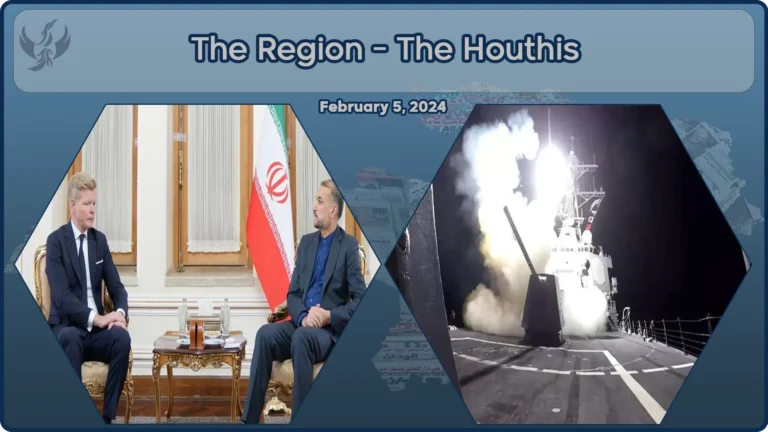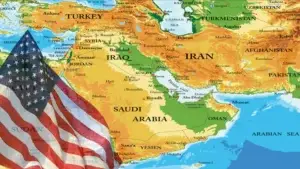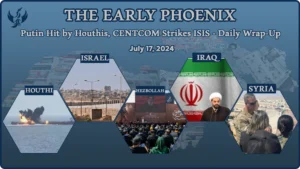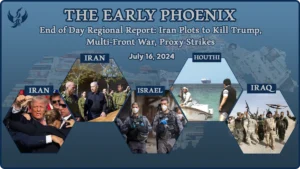U.S. and Allies Ramp Up Military Strikes Against Houthi Targets
- U.S. and Allied Forces Intensify Military Response to Houthi Threats in Yemen: A Comprehensive Report.
Friday’s military situation illustrated a day marked by significant military engagements and successful defense response. On Friday, the US Central Command conducted airstrikes targeting a Houthi drone control center and between 10-12 Houthi drones in Yemen. Notably, Yemeni naval forces reported claims that no one heard about targeting the American commercial ship “KOI” headed for Israel, using naval missiles with precise hits, shortly after targeting the American destroyer “USS Greeley” in the Red Sea.
On Feb. 3, at approximately 7:20 p.m. (Sanaa time), U.S. Central Command forces conducted strikes against six Houthi anti-ship cruise missiles prepared to launch against ships in the Red Sea. At approximately 11:30 p.m., U.S. Central Command forces, alongside UK Armed Forces and with the support from Australia, Bahrain, Canada, Denmark, the Netherlands, and New Zealand conducted strikes against 36 Houthi targets at 13 locations in Iranian-backed Houthi terrorist-controlled areas of Yemen.
On February 4, at approximately 4 a.m. (Sana’a time), U.S. Central Command forces conducted a strike against a Houthi anti-ship cruise missile that was prepared to launch against ships in the Red Sea. U.S. forces identified the cruise missile in Houthi-controlled areas of Yemen and determined it posed an imminent threat to U.S. Navy ships and merchant vessels in the region. Later, at approximately 5:30 a.m. (Sana’a time), U.S. Central Command forces carried out a strike against a Houthi land attack cruise missile. Beginning at 10:30 a.m. U.S. forces struck four anti-ship cruise missiles, all of which were ready to be launched against ships in the Red Sea.
The spokesman for the Yemeni Houthi movement, Muhammad Abdel Salam, said in a statement on Sunday “Regarding Yemeni military capabilities, we would like to emphasize that they are not easy to destroy and have been rebuilt in light of harsh years of war.”
Various sources previously indicated that the Houthi militia had relocated missiles and specialists from Sanaa to the governorates of Taiz, Hodeidah, and Hajjah, aiming to launch operations against commercial vessels navigating the Red Sea.
Tehran and the Islamic Resistance Movement Hamas strongly condemned the American-British bombing of Yemen, considering it a blatant attack on the sovereignty of a sister Arab country.
Experts on Arabic affairs have ruled out any change in the Iranian approach following the latest American strikes, noting that Iran aims to keep potential adversaries at bay to avoid direct military confrontations that could threaten its cities or homeland, thereby maintaining the status quo.
2. Iran Facilitates Dialogue Between Houthis and United Nations.
Iranian Foreign Minister Hossein Amir Abdollahian hosted discussions with both Mohammed Abdel Salam, the Houthi group’s spokesman, and Hans Grundberg, the UN envoy to Yemen. Abdel Salam praised Iran’s steadfast political support, underscoring Tehran’s significant sway over the Houthi movement. The Houthi representative lauded Iran’s unwavering political support, highlighting Tehran’s significant influence over the Houthi movement.
In his latest sermon, the leader of the Houthi group described the American and British strikes as “failed.” He also described his group’s classification by Washington on terrorism lists as “ridiculous,” and claimed to recruit 165,000 new militants alongside 600,000 others, and to continue developing military capabilities.
In parallel, Grundberg’s dialogue with Abdollahian highlighted Iran’s vital role in promoting regional stability, pointing out Tehran’s engagement in international peace and de-escalation efforts in Yemen. The Iranian Mehr Agency quoted Abdollahian arguing that labeling the Houthis as terrorists and targeting them militarily complicates the prospects for a political resolution.
Tariq Saleh, a member of the Yemeni Presidential Leadership Council, on Saturday, accused the Houthi group of dodging the peace process. He condemned the Houthis’ manipulation of the Palestinian issue to sidestep their obligations in Yemen, including the payment of salaries and provision of services to the populace.




